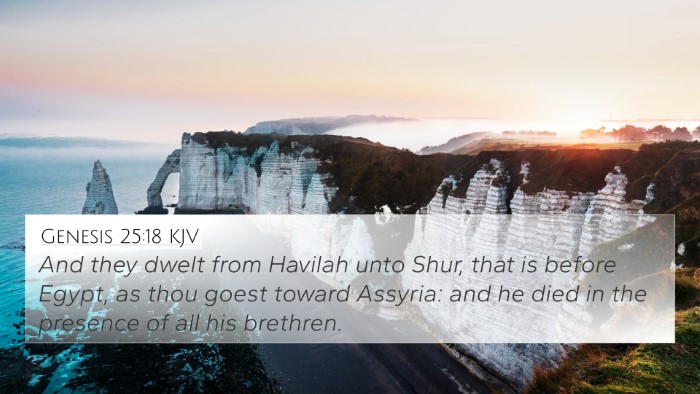Understanding Genesis 16:12
Genesis 16:12 states: "And he will be a wild man; his hand will be against every man, and every man’s hand against him; and he shall dwell in the presence of all his brethren." This verse speaks about Ishmael, the son of Abram and Hagar, and imparts profound insights into the themes of conflict, identity, and divine foresight.
Summary of Meanings and Insights
This verse reveals the nature and future of Ishmael, providing essential context for understanding the divisions that later arise among nations and families. The insights from prominent public domain commentaries have been synthesized below:
- Matthew Henry's Commentary:
Henry explains that Ishmael's existence would be characterized by conflict and strife. The term "wild man" suggests a person who is untamed, reflecting a tumultuous existence. The phrase "his hand will be against every man" indicates continual struggles and adversities that Ishmael would face, a reference to his descendants as well.
- Albert Barnes’ Notes:
Barnes remarks on the prophetic nature of this declaration. Ishmael’s life was to be one of isolation, suggesting that his descendants would also experience struggles with surrounding nations. Barnes emphasizes the significance of being "in the presence of all his brethren," highlighting the ongoing familial connections amid conflict.
- Adam Clarke’s Commentary:
Clarke notes the implications of this verse concerning the relationships between individuals and nations. He suggests that this portrayal of Ishmael serves as a foreshadowing of future enmity and conflict among nations emerging from Abraham’s family, especially when viewed alongside Isaac and the Israelites.
Thematic Bible Verse Connections
Genesis 16:12 is not an isolated declaration; it serves as a part of a larger narrative that can be linked to various other biblical themes and verses. Here are some important connections:
- Genesis 21:20-21: Describes God's provision for Ishmael in the wilderness, signifying that although he lives in conflict, God is aware of his plight.
- Jeremiah 49:32: A prophetic verse concerning the descendants of Ishmael, affirming that they will experience calamity, which echoes the traits described in Genesis 16:12.
- Galatians 4:22-23: Paul elaborates on the contrast between Ishmael (the child of the bondwoman) and Isaac, providing New Testament clarity on the implications of these two lineages.
- Genesis 25:18: The descendants of Ishmael are described as dwelling "from Havilah to Shur," reinforcing their existence as a group at odds with others.
- Isaiah 21:16-17: Speaks of the glory of Kedar, another name associated with Ishmael’s descendants, tying back to the theme of struggle and survival.
- John 8:39-44: Explains the ideological lineage of the enemies of Jesus as parallel to the historical narrative of the conflict originating from Ishmael, indicating a spiritual dimension to the racial dynamics.
- Revelation 7:9: Depicts a diverse gathering before the throne of God, implying that amidst historical conflicts, God's ultimate plan encompasses all nations, including descendants of Ishmael.
Cross-References Insights
The exploration of Genesis 16:12 can be enriched by considering cross-referenced verses, which highlight the ongoing dialogue within the Bible regarding conflict, divine prophecy, and nations:
- Genesis 17:20 - God’s promise regarding Ishmael's future.
- Genesis 32:28 - The Israelite struggle as a reflection of the ongoing familial conflict.
- Matthew 10:34-36 - Jesus discusses division among families, echoing the spirit of enmity described in Genesis 16:12.
- Romans 9:7-8 - Delving into the lineage of promises, reaffirming the duality found in Abraham's heritage.
- James 4:1 - Questions the source of conflicts among people, paralleling the natural outcomes highlighted in Ishmael's story.
Understanding the Implications
The implications of Genesis 16:12 extend far beyond its immediate narrative. It invites readers to reflect on:
- The nature of conflict within familial and national relationships.
- The overarching sovereignty of God in the history of nations and peoples.
- The struggle for identity faced by descendants of historically significant figures.
- How the themes of exile and belonging play out in spiritual contexts as well.
Tools for Bible Cross-Referencing
For those interested in deeper study, utilizing tools for cross-referencing can be beneficial:
- Bible Concordance: A comprehensive resource to find and study similar verses.
- Bible Cross-Reference Guide: Helps in identifying related scriptures for thematic Bible study.
- Bible Reference Resources: Such tools assist in finding connections between Old and New Testament verses.
Conclusion
Genesis 16:12 encapsulates the beginnings of conflict, identity, and the divine narrative intertwined with family relationships. By examining this verse through critical commentaries and relevant cross-references, one can gain a richer understanding of its significance in the biblical text and its resonance in contemporary spiritual discussions.







